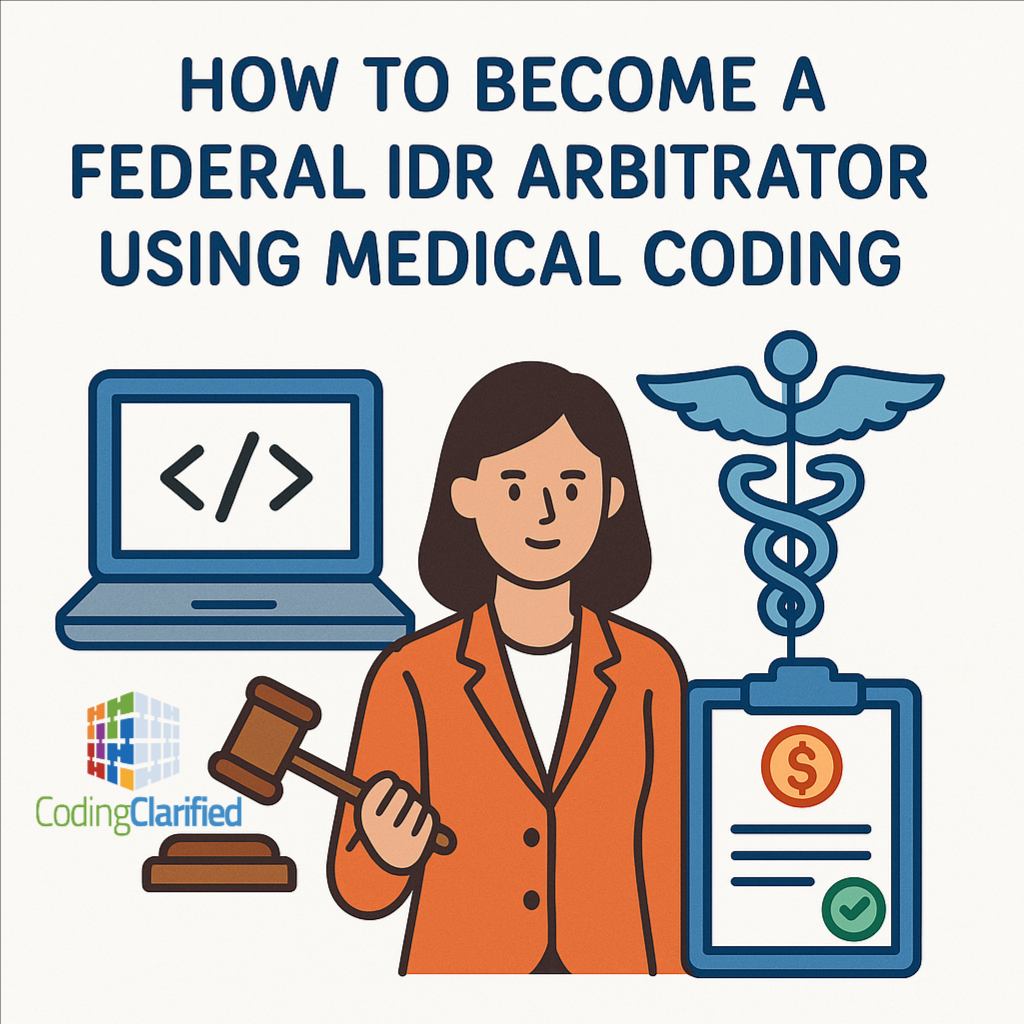How to Become a Federal IDR Arbitrator: Guidelines & Tips
The Federal Independent Dispute Resolution (IDR) process, established under the No Surprises Act (NSA), helps resolve payment disputes between health plans and providers for certain out-of-network services. Arbitrators (also called certified IDR entities) play a crucial role in reviewing claims, evaluating coding and billing accuracy, and issuing binding decisions. Learning how to become a federal IDR arbiter using medical coding will give you another option on your career path.
If you’re a medical coding professional, compliance specialist, or revenue cycle expert looking to expand your career, becoming a Federal IDR arbitrator can be a natural progression. Here’s what you need to know.
Understand the Role of a Federal IDR Arbitrator
A certified IDR arbitrator is responsible for:
-
Reviewing submitted medical claims, coding, and supporting documentation from both payers and providers.
-
Ensuring that ICD-10-CM, CPT/HCPCS, and modifier usage align with official guidelines and industry standards.
-
Applying the Federal IDR rules to determine which party’s payment offer is most reasonable.
-
Maintaining neutrality and adhering to conflict-of-interest standards.
This role requires strong medical coding knowledge, understanding of payer policies, and awareness of CMS and NSA regulatory guidelines.
Eligibility & Certification Requirements
To become an arbitrator, you must meet federal requirements outlined by the Centers for Medicare & Medicaid Services (CMS), the Department of Labor (DOL), and the Department of The Treasury. Key requirements include:
-
Professional Background: Experience in health law, medical coding/auditing, compliance, or dispute resolution. Coders with auditing and compliance credentials (CPC, COC, CIC, CPMA, or CCS) have a strong advantage.
-
Independence: You must not have financial ties to health plans or providers you might review.
-
Certification Process: Apply to CMS during open application windows to be listed as a Certified IDR Entity.
Application Process
-
Check CMS Notices: Applications are announced periodically on the CMS No Surprises Act Website.
-
Prepare Documentation: Demonstrate your organization or team’s expertise in medical coding, auditing, and dispute resolution.
-
Conflict of Interest Attestation: Provide safeguards that ensure impartiality.
-
Training: Arbitrators must complete federal training on the No Surprises Act and IDR procedures.
How Medical Coding Guidelines Apply
Medical coders bring critical expertise to the IDR process. Arbitrators must:
-
Verify Coding Accuracy: Ensure ICD-10-CM diagnosis codes, CPT/HCPCS procedure codes, and modifiers are applied per official guidelines.
-
Check Medical Necessity: Confirm services align with CMS and payer coverage policies. What is Medical Necessity
-
Evaluate Documentation: Compare clinical notes with coding to validate correct claim submission.
-
Identify Common Errors: Such as upcoding, misuse of modifiers (e.g., 25, 59, X-modifiers), or improper bundling/unbundling.
Tips for Coders Interested in Becoming Arbitrators
-
Advance Credentials: Obtain auditing or compliance certifications (CPMA, CIC, COC, CCS).
-
Stay Current: Follow CMS updates, ICD-10-CM/PCS guidelines, and CPT Assistant references.
-
Develop Neutrality: Gain experience in both provider and payer environments to strengthen your impartial perspective.
-
Sharpen Legal & Compliance Knowledge: Learn arbitration procedures, payer contracts, and the No Surprises Act.
-
Practice Case Review: Review de-identified claims and practice writing objective justifications for coding/payment decisions.
Career Benefits
Becoming a Federal IDR arbitrator expands your role from coding and billing into healthcare law, compliance, and arbitration. This career path offers:
-
Higher earning potential from dispute resolution services.
-
National recognition as a healthcare arbitration expert.
-
A unique niche combining coding expertise with federal regulatory compliance.
Coders with strong auditing, compliance, and regulatory knowledge are uniquely positioned to serve as Federal IDR arbitrators. By combining technical coding skills with training in the No Surprises Act, you can expand into this high-demand career field.
The 15 Certified Federal IDR Entities (Names & Links)
CMS last modified the official list on September 19, 2025; it currently shows 15 certified organizations. We’ve included the entity names exactly as listed and linked to the websites shown on CMS’s page. CMS
-
C2C Innovative Solutions, Inc. – https://www.c2cinc.com
-
Capitol Bridge, LLC – https://capitolbridgellc.com
-
EdiPhy Advisors, LLC – https://www.medmanagementllc.com
-
Federal Hearings and Appeals Services, Inc. – https://www.fhas.com
-
iMPROve Health – https://www.improve.health
-
Island Peer Review Organization (DBA: IPRO) – https://ipro.org
-
Keystone Peer Review Organization, Inc. – https://www.kepro.com
-
Livanta, LLC (DBA: Commence) – https://commence.ai
-
Maximus Federal Services, Inc. – https://fednsa.maximus.com
-
MCMC Services, LLC – https://www.mcmcllc.com
-
Medical Evaluators of Texas (DBA: MET Healthcare Solutions) – https://www.met-hcs.com
-
National Medical Reviews (DBA: National Medical Reviews, Inc.) – https://nationalmedicalreviews.com
-
Network Medical Review Company (DBA: Network Medical Review Company, Ltd.) – https://www.nmrco.com
-
ProPeer Resources, LLC – https://www.propeer.com
-
Provider Resources, Inc. – https://www.provider-resources.com
(The American Hospital Association also noted CMS’s addition of two new entities in June 2025, bringing the total to 15.) American Hospital Association
Useful Official Links (Bookmark These!)
-
CMS: List of certified IDR entities (official, with fees and links). CMS
-
CMS: Apply to be certified (overview + application portal). CMS
-
Quick Reference Guide for the certification application (PDF). nsa-idr.cms.gov
-
Guidance for Certified IDR Entities (PDF). CMS
-
Guidance for Disputing Parties (helpful to understand upstream process/timelines). CMS
-
Federal IDR reports & PUFs (program data and documentation).
Read more Coding Clarified blogs here Coding Clarified Blog

